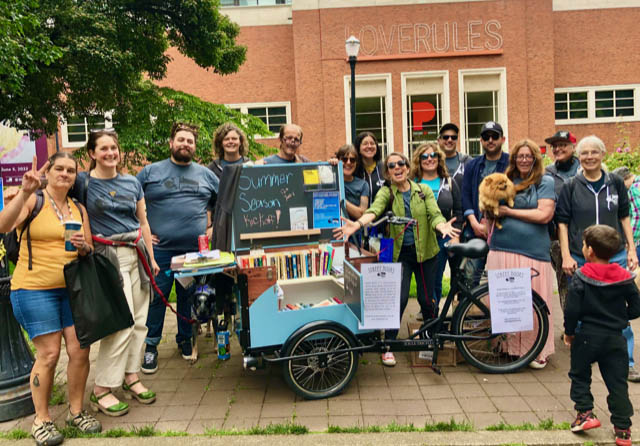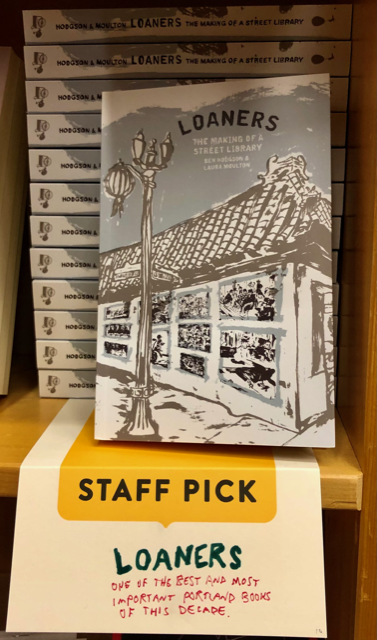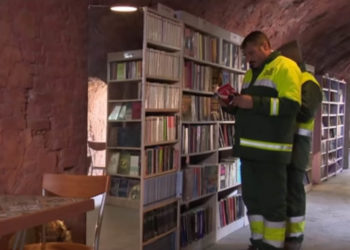Editor’s Note: Today’s post is by Madelyn Stone, the Membership Administrator for the Society for Scholarly Publishing (SSP).
At this year’s Annual Meeting, the SSP and it’s attendees will be supporting Street Books — a non-profit mobile library that serves people who live outside in Portland, Oregon. SSP Membership Administrator, Madelyn Stone interviewed founder, Laura Moulton to learn more about how this unique library came about and how it serves the houseless residents of Portland.
When Laura Moulton began bicycling out a cart of books around Portland, Oregon in the summer of 2011, she had no idea what the project she was launching would become. An artist, writer, and educator, Moulton had conceived the idea of a mobile public library as an art project. Focused on serving community members living without shelter, the library issued each patron a library card without asking for an identification or proof of address that brick-and-mortar libraries require. For three months she brought out books on bicycle-powered carts, lending them to neighbors she got to know well.
As the summer drew to an end, she was preparing to wrap up the project. But as one library patron named Keith returned his books and checked out new ones, he said, “See you next week.” The reality of what she had established became clear.
“I was really struck by how I created this community through this service. And I couldn’t just fold it up like any old art project. It was something that I initially had imagined to be a short-term thing, but there was an immediate community that sprung up around books, and conversations about books. So I immediately began to figure out how I could keep it going.”
And kept it going, she has. With the help of volunteers and community partners, Moulton expanded the mobile library service to become Street Books. Twelve years since the launch of the art project, the organization is now an officially registered non-profit. Running it is a full-time job. Volunteers have become paid staff and board members, the team runs shifts five days a week, and operations have expanded to provide winter weather gear and reading glasses.

Regular patrons who now serve on the board include Ben Hodgson, who started checking out books from the library in its earliest days. At the time, he was living without shelter. He now has housing and works as an inventory specialist for the organization. In 2021, Hodgson and Moulton published a co-written account about the making of Street Books, Loaners. The memoir is a co-release by Street Books and the small Portland press Perfect Day Publishing, available for $15 a copy or as a “Buy One, Give One” package for $30, with the second copy to be given for free to a Street Books patron.
In the landscape of Portland’s community service sector, Street Books fills an unconventional niche. Moulton said that, in the beginning, “I had some misgivings about having books to offer instead of something like a sandwich or a pair of socks, but very quickly I realized that people were into it, once the patrons realized that the project was geared toward them.”
Remembering patrons’ names week-to-week, bringing them specific requests, and being “a pretty recognizable little crew” with their bicycles and book carts facilitated the cultivation of a real community. Key to this process was a sense of open-mindedness. Latent assumptions about people experiencing houselessness often include that they would lack an interest or ability to read, that reading would be unimportant to them, or that they lack the literary taste of their neighbors who have housing. In reality, this is far from the case.
Street Books staff are full of telling anecdotes. They like to mention the patron who once requested a work by Nietzsche, only to decline the copy Street Books had on hand—it was not the right translation. One of Hodgson’s first comments on the library’s selection was a blistering if well-meaning critique: “What kind of self-respecting librarian doesn’t have any P. G. Wodehouse?” Another regular patron can often be found holding a Thomas Pynchon novel. The books that are frequently requested span a wide gamut, from literary fiction and westerns to history and works by BIPOC and LGBTQ writers.
 “In terms of the books, that was something that I constantly had to rearrange my thinking on,” Moulton explained. “I would think that I was embarking in a pretty open-minded way, but then, if I had a sensation of surprise at somebody requesting something, I would realize, ‘Ah, okay, I have been making an assumption about this person.’ So it was this constant revision of my thinking, and we’ve had such cool experiences over time where real readers sought us out.”
“In terms of the books, that was something that I constantly had to rearrange my thinking on,” Moulton explained. “I would think that I was embarking in a pretty open-minded way, but then, if I had a sensation of surprise at somebody requesting something, I would realize, ‘Ah, okay, I have been making an assumption about this person.’ So it was this constant revision of my thinking, and we’ve had such cool experiences over time where real readers sought us out.”
Listening to patrons, coming out consistently, and keeping practical issues in mind made it possible to develop genuine connections and meaningfully serve the community. As part of this approach, Street Books stopped accepting hardcover books when pandemic shut-downs left them unable to access community rooms for book storage and reading spaces.
“When all of those places shut down, we suddenly had less bandwidth generally. We have a limited amount we can carry, like 40 to 50 books, on our bicycles. If they’re hardback, then it cuts that down considerably. We’re also conscious of weight in people’s backpacks or gear, and paperbacks are a better fit for that reason,” Moulton explained.
At SSP’s Annual Meeting this year in Portland, attendees are invited to bring paperback books to donate, especially ones from the organization’s wish list. Street Books will bring their library bike to the opening reception on Wednesday, May 31 for attendees to learn more, donate, and purchase copies of Loaners, with proceeds going to Street Books.
As Moulton put it, SSP’s decision to host the Annual Meeting in Portland is at once a fitting opportunity and a promising sign.
“Your conference is such a perfect match. Because anytime there’s a bunch of book lovers in one room, they can compare notes, they can have conversation,” she said, adding that “Much is being said about the decline of Portland, but in fact I’m enormously hopeful that there is a next chapter for our city, and that it involves a more intentional approach to making sure that everyone is thriving, and not just the people who can afford really expensive housing. I think that there is enormous possibility, but people need to be taken care of along the way, you know?”
If publishers or individuals would like to make more substantial donations to Street Books before or after the meeting or you are not able to attend the meeting in-person, books can be shipped to PO Box 13642, Portland, OR 97213. Due to storage limitations, please limit donations to no more than 3 copies per title; paperback books only.
Discussion
2 Thoughts on "Guest Post — Street Books: A Non-profit Mobile Library Serving the Houseless Residents of Portland"
This is such an awesome initiative on so many levels. Everyone has the right to the great world of reading, regardless of where they live. Where I’m located, in Rockville MD, we have an awesome public library, but also a network of Free Little Library which is a real blessing to all in the community. But this project takes it to the next level. I’ll be looking our some books to bring to SSP for donation (I know my wife will be delighted to have a tidier house too!). Keep up the great work!
Thanks Matthew! We’re really excited to be able to connect SSP and Street Books!



